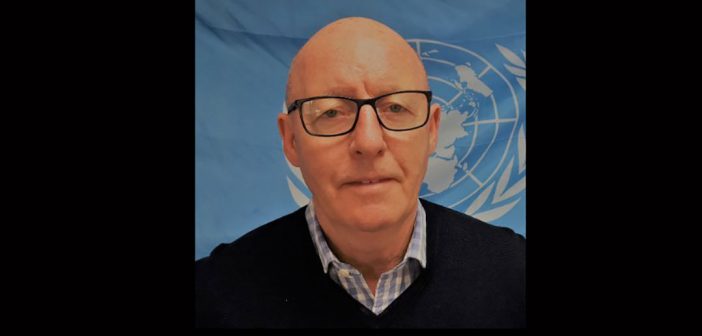On June 11, McGoldrick, a resident of Scotland who also served as United Nations Resident Coordinator and Humanitarian Coordinator for the Occupied Palestinian Territory, was made Commander of the Order of St Michael and St George.
He said he considered himself to be extremely fortunate to have worked in the international humanitarian and development sector for nearly three decades, for the United Nations, the Red Cross, and Save the Children. He felt honored to receive the award.
“Yet the real recognition goes to all the inspiring and humbling people with whom I have worked over the years, in particular national staff members, in both U.N. agencies and non-governmental organizations, in armed conflicts and disasters in the Middle East, Africa and Asia. This award is a testament to their hard work and dedication, often in the most challenging of circumstances. The award as much for them as it is for me,” he said.
In his new role as an institute fellow, McGoldrick shares the insights and lessons that he has accrued from thirty years of working in the field of humanitarian aid with the next generation of aid workers.
He has also been an instructor at the institute’s International Diploma in Humanitarian Assistance for the past two decades.
In April 2020, he delivered a preview of his new role, during the fifth installment of the IIHA’s Ireland at Fordham Humanitarian Lecture Series. He dedicated the lecture to addressing the operational challenges of interacting with non-state actors and de facto authorities, specifically Hamas in Gaza and the Houthis in Yemen.
“The two main challenges [to humanitarian assistance]are a more political grip on humanitarian funding and humanitarian access,” he said.
“Reductions in funding globally are occurring as humanitarian needs grow and are linked increasingly to humanitarian assistance choices based on political considerations and impacted by a growing world disorder. The other biggest obstacle facing humanitarians is access.”
McGoldrick’s involvement in humanitarian affairs began in 1991 when he visited Sierra Leone as part of a delegation from Save The Children, and he would go on to visit countries such as Pakistan, Lebanon, Georgia, and Nepal, to help distribute aid to victims of war and natural disasters.
The work would not have been possible without the support and understanding of his family, he said.
“They stood by me throughout various crises, including from a distance when we had to live apart for long periods of time. A big thank you to them.”



